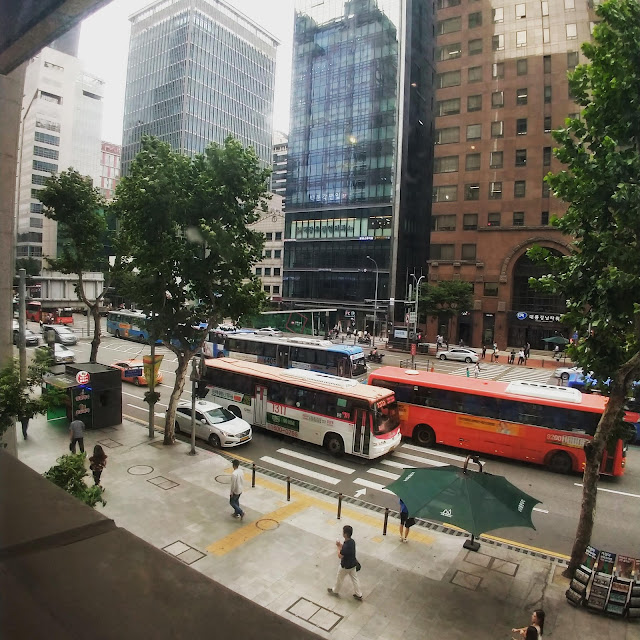24/7 Seoul
Although this is a expensive high tech mega-pol with modern skyscrapers and luxury malls it hide some secrets
The work
I saw that many restaurants, cafe, pubs, shops have generous opening hours and some of them don't close at all. The prices where not so high compare to some cities i was before like Berlin, London, Stockholm but they never have open so late. So what is the secret of this success combining late open hours and cheap services and food?
The Korean man by name John as he called him self have appeared from nowhere and seems that he waited to tell for somebody how the things look like from inside in Seoul and Korea, i think he did that to show his small protest. According him people in Korea is on third place in the world by spending most hours on the work, yeah hard working people and they don't get pay for overtime because if the boss is on the work then you should be there too no matter how long. This goes back in that old time when everything was based on family, when you get a job then you get a family too. Some invisible bands connect you with your work and you should be thankful that you can feed your family. The same if boss want to hang out after work you can't say no, that is true. I asked but if you have a birthday with your family what happen then? Well then you go to after work hangout anyway. Basically you don't have any private life you can't plan in advance your schedule or any other activities after work. If you get a job and think that you should be happy, then you are wrong, because you actually find your cage.
The Food

 I swear I didn't see something like this in my entire life. Food shops, groceries, markets, street kitchens, street food and delivery of food almost everywhere and anytime, Seoul drown in it. People are used to buy food and share together from the same stew and doesn't matter if you know the person many years or doesn't no it at all, this could happen on the work out dinner or with friends or an a dating. On my question if the food is really part of the Korean culture then John answered: ''family'' word from Korean consists of two joined words meaning ''eat together'' he explained that people not so far away where so poor that they gathered together to eat from the same stew. From here comes even the national dish called ''bibimbap''. The dish consist only of vegetables and just sometimes egg or chicken, why that? Because people couldn't afford meat in that time.
I swear I didn't see something like this in my entire life. Food shops, groceries, markets, street kitchens, street food and delivery of food almost everywhere and anytime, Seoul drown in it. People are used to buy food and share together from the same stew and doesn't matter if you know the person many years or doesn't no it at all, this could happen on the work out dinner or with friends or an a dating. On my question if the food is really part of the Korean culture then John answered: ''family'' word from Korean consists of two joined words meaning ''eat together'' he explained that people not so far away where so poor that they gathered together to eat from the same stew. From here comes even the national dish called ''bibimbap''. The dish consist only of vegetables and just sometimes egg or chicken, why that? Because people couldn't afford meat in that time.The city
I appreciate how things looks round me, modern glass, stones, steel, green fields and trees. The roads in generally are clean and colorful signed for different purpose seems they strive to perfection which the koreans learned from Japan as the mysterious man John pointed.

The Seoul's approach to make the city more sustainable and more green lifts the city to tops ranks of sustainability index. Smart urban design and open spaces capture the public to spend more time outside and enjoy the closeness to the green fields. There is some projects to get forest on the roofs and indoors how by instance the Guinness world record of the tallest vertical indoor garden, 7 stories by the fact, this impressed me a lot.

While the center or new area takes all the roses the suburbs or older block leaves a bad smell and challenges behind the scene. But at the same level this areas could inspire and depressed at least the best electrician who never saw a wire jungle :)

The people
Korean fast raising in many spheres as high-tech, telecommunication car manufacture, construction, naval buildings, iron metallurgy and first in the world to launch 5g wi-fi leaves behind many countries. But there is for sure a connection between those impressive achievements. This inflow of many and rising level of living standards change behavior of people but not also their mentality. Our man says that people buy expensive stuff to look more glamorous and pretend to be successful though by the fact there isn't take in account your personality. Is not appreciated to be an individualist your are ruled to be the same as other and don't stich out from the majority. The hierarchy of these old school people suppress those who think more open and wider. People don't think about future instead spending huge amounts of money in the present: people don't have a vision and this make me sad, explained John. He comes with example of Germany and Japan where people save a lot to face next coming problems. I think he is wise enough to make me believe in what he told me about his reflection. John disappeared suddenly in the same way as he appeared, I didn't even reached to take his contacts in case of future visits in Seoul. So sad :(














Comments
Post a Comment